The Lex Titia…
November 26, 2014
As part of the Nottingham Anniversaries through Coins project, Mike Welbourn describes how, on this day, 26th November, in 43 BC, the lex Titia was passed at Rome. By this law a board of three men was given complete control over the Roman state. The lex Titia turned Rome into a de facto dictatorship, and …
The Power of (Moving) Pictures
November 23, 2014
Esther Eidinow reports on the first seminar of the Teaching and Learning Ancient Religion Network (TLAR), and the power of Panoply… Sonya Nevin is working magic. It’s a cold, wet evening, and 15 people, seated around a table in a room in Senate House, London (kindly sponsored by the ICS), are staring up at a …
On this day, 20 November, in AD 284, Diocletian became Roman emperor.
November 20, 2014
As part of the Nottingham ‘Anniversaries through Coins’ project, Lois Howorth, a first-year Classics student describes the rise to power of Gaius Aurelius Valerius Diocletianus (usually known simply as Diocletian). Diocletian began life very humbly. The future emperor was originally named Diocles and came into the world in 240 or 244 on the Dalmatian coast. …
Journeying to the Outer Limits
November 15, 2014
Doug Lee finds connections between the Rosetta space mission and an ancient pilgrimage. The European Space Agency’s successful mission to land a probe from the Rosetta spacecraft onto a comet in outer space has been headline news, and understandably so. The technical achievement involved in guiding a lander the size of a washing-machine onto an …
We have two blog entries today, both from doctoral students in Classics: in the first, Peter Davies, reflects on the legacy of the poet Simonides’ words in commemorating the fallen…
November 11, 2014
After the battle of Thermopylae – immortalised by Herodotus and, in our own time, given new fame by Snyder’s epic 300 – the Lyric poet Simonides wrote an encomium for the Greek dead. In 1838 John Sterling would translate some of his words thus: Of those who at Thermopylae were slain, Glorious the doom, and …
On this day, November 8th, in AD 30, Marcus Cocceius Nerva was born.
November 8, 2014
As part of the Nottingham Anniversaries through Coins project, Mike Welbourne offers some thoughts on Nerva, Rome’s twelfth emperor, on the anniversary of his birth. According to Aurelius Victor (Epitome de Caesaribus, 12.1) Nerva was born in the Italian town of Narnia. On his father’s side he came from a family that had been intimately …
Enjoying Receptions of Athenian Tragedy
November 2, 2014
Larissa Ransom, who is studying for an MA in Classical Literature, has recently seen Pilot Theatre’s Antigone, National Theatre Live’s Medea and Broadway Theatre Archive’s Antigone. Here she muses on how this has changed her thinking about Greek tragedy… It is commonly believed that much of a book is lost when turned into a …
Why Latin is Not a Dead Language
October 26, 2014
Juliet O’Brien, a first-year student studying Ancient History and History at the University of Nottingham, explains why she thinks Latin still lives! Latin is dead. Its decline has caused it painlessly to pass away in its sleep. It has been laid to rest in a stately marble tomb. RIP. Rubbish! Latin still breathes. As …
Tig, You’re It
October 17, 2014
Lynn Fotheringham, Director of the Centre for Ancient Drama and its Reception (based in the Classics Dept at Nottingham University), reviews Pilot Theatre’s current production of Antigone. Pilot Theatre’s production of Sophocles’ Antigone (in a new version by Roy Williams) came to the Lakeside in the same week that we were covering screen-versions of Greek …
A Herculean Achievement: The Twelve Labours of… Vladimir Putin
October 12, 2014
Esther Eidinow reports on an intriguing use of ancient Greek myth… Herakles, Hercules, Melqart… Putin: a celebration of the Russian leader’s achievements put Greek myth back on the map last week. An exhibition of pictures, organised by a Facebook group of Putin’s supporters, showed the President engaged in Herakles’ different tasks—each repurposed to represent a …


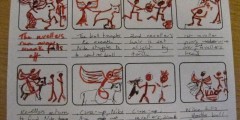
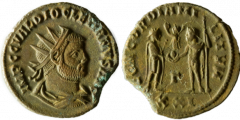


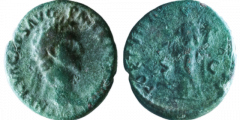
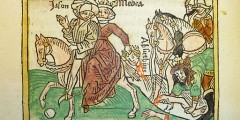

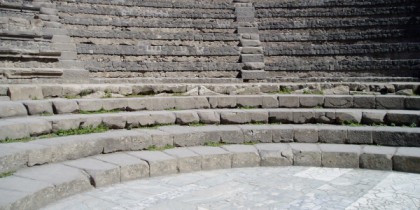
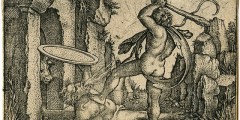
Recent Comments